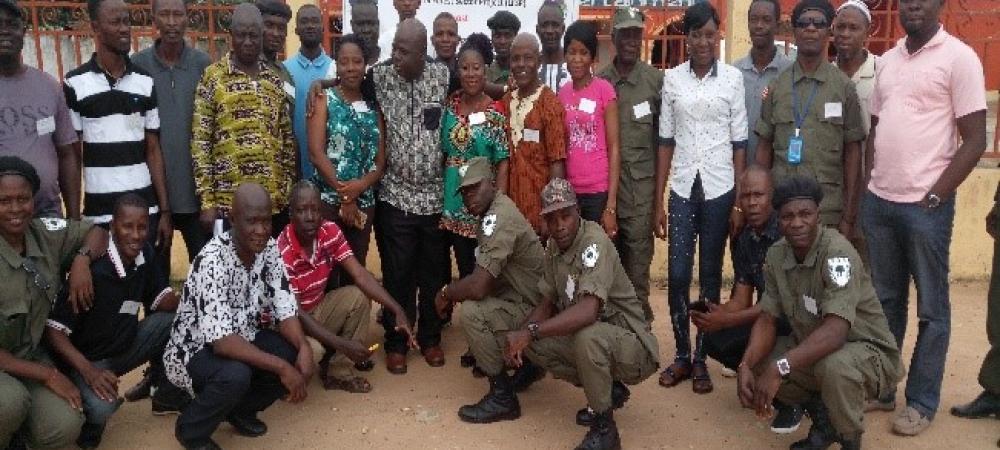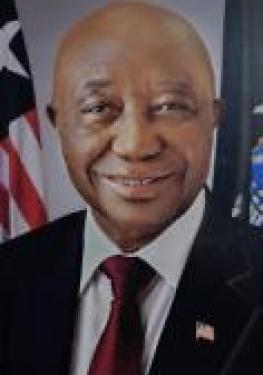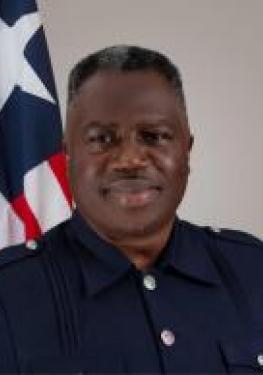
…Forest Rangers, Environmental Inspectors, Conservation Assistants others
The Liberia Forest Sector Project (LFSP) with funding from the Government of Norway and being administered by the World Bank has procured several moving machineries to carry out project activities aimed at achieving the Project Development Objective (PDO) – improved management of, and increased benefit sharing in, targeted forest landscapes. The project has procured cars, motorbikes, motorized boat etc. for different project Implementing Entities (PIEs) staffs in the field to facilitate their works and strengthen management in the landscapes.
To this end, the Environmental Protection Agency (EPA) of Liberia conducted three (3) regional Health, Safety and motorbike maintenance and management training for field staff including forest rangers, environmental inspectors, natural resource management officers and conservation assistants from the EPA, Forestry Development Authority (FDA) etc. These trainings were conducted from August 12-21, 2018 in Bomi, Lofa and Nimba Counties respectively and trained about 131 participants.
Presenting on the objectives of the training, Mr. Nick Benitos Goll, II, Environmental Safeguards Coordinator, of the LFSP stressed that purchasing a brand new moving motorbike is good, but the health and safety of the rider/staff is of serious concerns to the LFSP relative to the World Bank’s Environmental and Social Safeguards procedures. He noted that the work in the field cannot be carried out once the staff are unhealthy or injured. “Knowing how to maintain your expensive piece of motorbike and keeping it in fantastic working order is just as important”, he concluded.
The training was comprised of two major modules: Health and safe cycling and Motorbike management (theory and practice). The training was characterized with presentations, Focus Group Discussions (FGDs), Park Wardens’ experience sharing, health and safety video and “hands-on" training on motorbike management and maintenance.
As part of the training, participants were taught the importance of wearing Personal Protective Equipment (PPEs) like helmet, long pants, long-sleeve shirt, safety boots etc which are essential to the protection of life and the promotion of good health while riding motorcycles that have been assigned to them. They also learned how to ride safely and observe traffic rules to prevent unwanted accidents and injuries.
In his presentation entitled ‘Safe motorcycling’, a Health and Safety professional, Abayomi B. C. Grant cautioned participants to always wear helmet while riding motorbike assigned to them. He unveiled to his audience that helmet is one the most important PPEs that must be wore at all times to help prevent fraction of the head in case of accident.
Mr. Grant presented that about 68 percent of the accidents that occurred in Liberia in 2014 involved motorcyclists and asked participants to exercise care, while using the bikes. He warned them against overtaking in curve and keep away from using mobile devices while riding as well as wearing dark clothes at night. Mr. Grant requested riders to observe their speed, especially when plying rough corridors. He also cautioned riders against the intake of alcoholic beverages and harmful substances that might blur vision and result to accident.
For the bike management and maintenance aspect of the training, the project hired Mr. Abraham Toure, Instructor from the Forestry Training Institute (FTI) to facilitate this aspect. Mr. Toure taught the participants about the basic parts of the motorbike and their functions. He also taught them on how to carry on routine maintenance of the motorbikes. At one of the trainings, Mr. Toure asked participants “what exactly do you check for on the motorbike daily”? Furthermore, participants were taught practically on how to do minor mechanical maintenance on the motorbike, troubleshooting and the need to abide by the maintenance schedule.
As a word of caution, Mr. Toure told participants that the maintenance and repair aspect bikes is very important and asked them to regularly change the bike’s engine oil. He also used the training to warn participants against exposing their bikes to sunlight and rainfall and encouraged them to regularly change air filter to increase the lifespan of their bikes. “Please cutoff the engines of your bikes when refilling,” he told participants.
Mr. Toure demonstrated on how riders should get off the bike taking into consideration the position of the absorb pipe to avoid injury. He also provided them techniques on how to cut and joint motorcycle’s chain in case of emergency, but stressed the need for immediate replacement.
At the end of the presentations, participants raised several concerns including need for the project/ their institution to provide them with additional basic PPEs having learned how to keep safe. Also, the park wardens admonished their staff to follow what has been taught to prevent accidents and promote good health.
John Smith, Park Warden of Gola National Park thanked facilitators for the level of education provided and promised that all precautionary measures would be taken to avoid accidents. He vowed to ensure that all riders are properly attire in PPEs at all times while riding and assured that “narcotic and alcohol will be highly prohibited”. He cautioned all rangers to not ride on their motorbike individuals who are not employees of the FDA.
Also speaking, Wonegizi Nature Reserve Park Warden, John Flomo thanked the project for the level of assistance and coordination they are enjoying. He told participants that since the arrival of the motorbikes, they have increased patrol and have carried out other daily functions with ease. According to him, they have not experienced or received any accident case, since the arrival of the motorbikes.
In closing remarks, Mr. Z. Elijah Whapoe, EPA Focal Point/LFSP encouraged the participants to do their best to meet with the project objectives and goals. He also informed the riders to take ownership of the motorbike; “Ownership of the motorbike means there is an assurance for long life and that riders will in-provide if there is a problem on the bike in order to keep the motorbike in progress”, Mr. Whapoe said. He also encouraged all participants to always give recommendations to help strengthen the work of the project staff as they make progress to the next level.
Closing the training, Mr. Saah A. David, Project Coordinator/ RIU thanked the EPA, the Environmental Safeguards Coordinator – Nick Benitos Goll, II – and all the participants for the training. He encouraged participants to take seriously and fully implement what they have learnt. He told them that the full implementation of one phase will lead to the next phase of the project. Mr. David also encouraged the participants to take their safety first and hope to continue the training in subsequent time.



